On November 13 and 14, the Second National Doctoral Consortium of Library Science with the theme of Inheritance and Innovation of Library Science in Digital Intelligence Era was held at the SIM. The conference took the form of Tencent virtual meeting+live broadcast, virtual and reality combination, and was held via invited reports, panel discussion, and workshops.
People attended the opening ceremony and related activities were as followings:
Chuanfu Chen, Professor and Dean of the Graduate School, Wuhan University,
Jianjun Sun, Professor and Dean of the School of Information Management, Nanjing University,
Jiuzhen Zhang, Professor and CPC Secretary and Director of the Department of Information Management, Peking University,
Chuanjun Suo, Professor at the School of Information Resources Management, Renmin University of China,
Jianxun Zeng, Research Librarian and Director of the Information Resource Center, Institute of Scientific and Technical Information of China,
Jing Zhang, Professor and Executive Associate Dean of the School of Information Management, Sun Yat-sen University,
Yuelin Li, Professor and Director of International Cooperation and Exchange Department, NanKai University,
Yuhai Li, Professor and Dean of the School of Information Management, Central China Normal University,
Pengyi Zhang, Tenured Associate Professor and Deputy Director of the Information Management Department, Peking University,
Dan Wu, Professor and Associate Dean of the Undergraduate College and Director of Academic Affairs Office, Wuhan University,
Xiaoguang Wang, Professor and Associate Dean of the School of Information Management, Wuhan University,
Lihong Zhou, Professor and Associate Dean of the School of Information Management, Wuhan University,
Congjing Ran, Professor and Director of Library Science Department of the SIM, Wuhan University,
and all teachers and student representatives of Library Science Department.
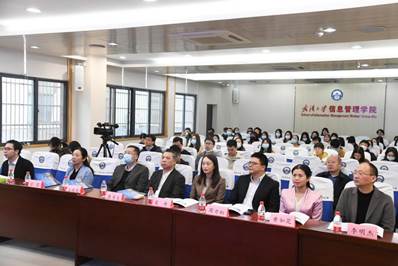
At the opening ceremony, Chuanfu Chen reviewed the historical inheritance and development of library science education systematically, and summarized the historical opportunities brought by the major events such as the Second World War, the technological revolution, the birth of the Internet, the rapid development of big data technology and the COVID-19 epidemic. "Inheriting civilization and serving the society", citing General Secretary Xi Jinping's important speech, Chuanfu Chen expressed the initial intention and mission of the library community: to stand on the position of meeting the needs of the country, people and even human beings, develop subject education, embrace new technologies, strengthen subjects and teams, and better adapt to the development of national economy.
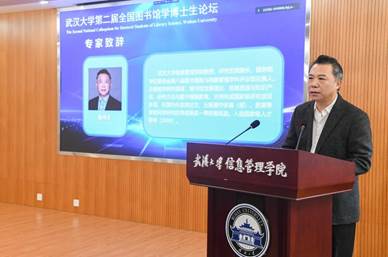
Jianjun Sun put forward ardent hopes for the students majoring in library science. He hoped that students would carry forward their youthful vigor in research and dare to study new topics and problems in the digital age. Learn more skills, and “data-driven” themselves better. As the Yangtze River surges on wave upon wave, so the academic heritage must be surpassed. Students should share research results actively, and exchange setbacks and experiences. He wishes everyone a bright future and a promising future.
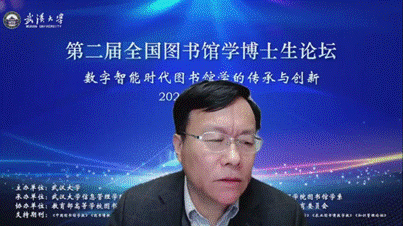
Jiuzhen Zhang hoped that young teachers should stick to the professional spirit, do their duty of teaching and educating students, and strive to be the guide of subject development and a good example for students. She also encouraged young scholars and graduate students to act as witnesses to shoulder the girders and stick to their original intentions. Meanwhile, she expressed her confidence in the subject.
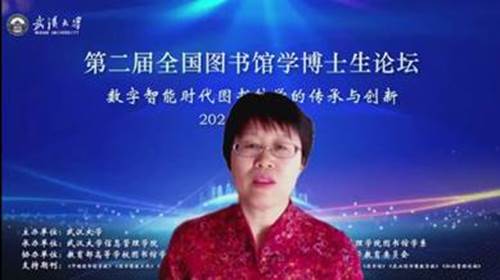
Wei Lu put forward profound views on the opportunities and challenges faced by the development of Library Science in the era of big data and artificial intelligence. He pointed out that we should gather wisdom, seize opportunities and live up to the new era.
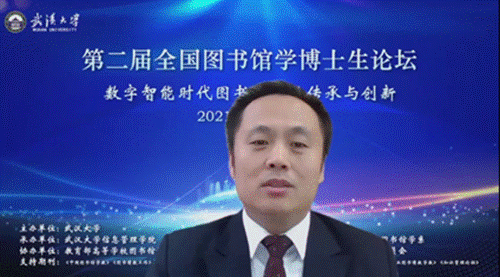
In the keynote report session, Chuanjun Suo, Professor at the School of Information Resources Management, Renmin University of China, focused on the theme of Thinking About the Development of Library Science, and made deep thinking from three aspects: problems to be faced in the development of Library Science, inspiration from Popper's Three Worlds Theory, subject problems and values.
Jianxun Zeng, Research Librarian and Director of the Information Resource Center, Institute of Scientific and Technical Information of China, made a keynote report on The Essence and Countermeasures of Library Discovery System. He discussed the essence of library discovery system, the subversion of resource discovery system and the strategy of libraries facing subversion.
Jing Zhang, Professor and Executive Associate Dean of the School of Information Management, Sun Yat-sen University,reflected on the development trend, strategic planning and service system construction of public libraries, and discussed why "return" and what "professional" is in the keynote report Professional Return and Subject Introspection of China’s Library.
Yuelin Li, Professor and Director of International Cooperation and Exchange Department, NanKai University, shared the results of Influencing Factors and Practical Empowerment of Information Disclosure, discussed the definition of "information disclosure quality", and divided it into three parts: information disclosure process quality, information disclosure quality and empowerment quality (social impact effect). She focused on the current situation, concepts and methods, influencing factors, effects and prospects of information disclosure from the perspective of empowerment quality.
Yuhai Li, Professor and Dean of the School of Information Management, Central China Normal University, gave a report on A Thought of "Internet +"Smart Library. He believed that compared with digital library, smart library has opened the era of "data life", and he shared the development and research situation of "Internet +" smart library, thinking about the architecture levels of smart library, and the development progress of intelligent shelving system, etc.
Based on the "people-oriented" perspective, Dan Wu discussed Artificial Intelligence from the Perspective of Human-Computer Interaction. She believed that the powerful function of artificial intelligence and the increasing application fields require us to pay attention to "user-centered algorithm fairness", reveal the problems and trace back to the source, and approach the users' needs. Develop "interpretable artificial intelligence" with algorithm model as the cornerstone, user needs as the bridge and interpretable assessment as the auxiliary.
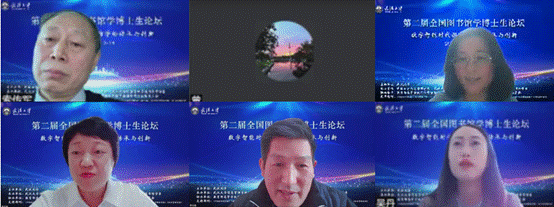
At the closing ceremony, Ximing Xiao, Professor at the School of Information Management, Wuhan University, announced the award-winning papers of this Doctoral Consortium, and Siluo Yang, Professor and Deputy Director of Library Science Department of the SIM, Wuhan University, read out the pre-accepted papers. Congjing Ran affirmed the contribution of this Doctoral Consortium to Library Science education and scientific research exchange, and expressed his confidence in the development of Library Science education and his earnest expectation for the new generation of students in the field of Library Science.
This Doctoral Consortium received a total of 78 submitted papers, of which 62 papers were shared in 12 sub-forums, and 36 experts commented. The peak number of online participants exceeded 800. The Doctoral Consortium selected 13 award-winning papers, including 2 first prize papers, 4 second prize papers and 7 third prize papers, and 20 papers were recommended for pre-accepted in 8 journals such as Journal of Library Science in China.